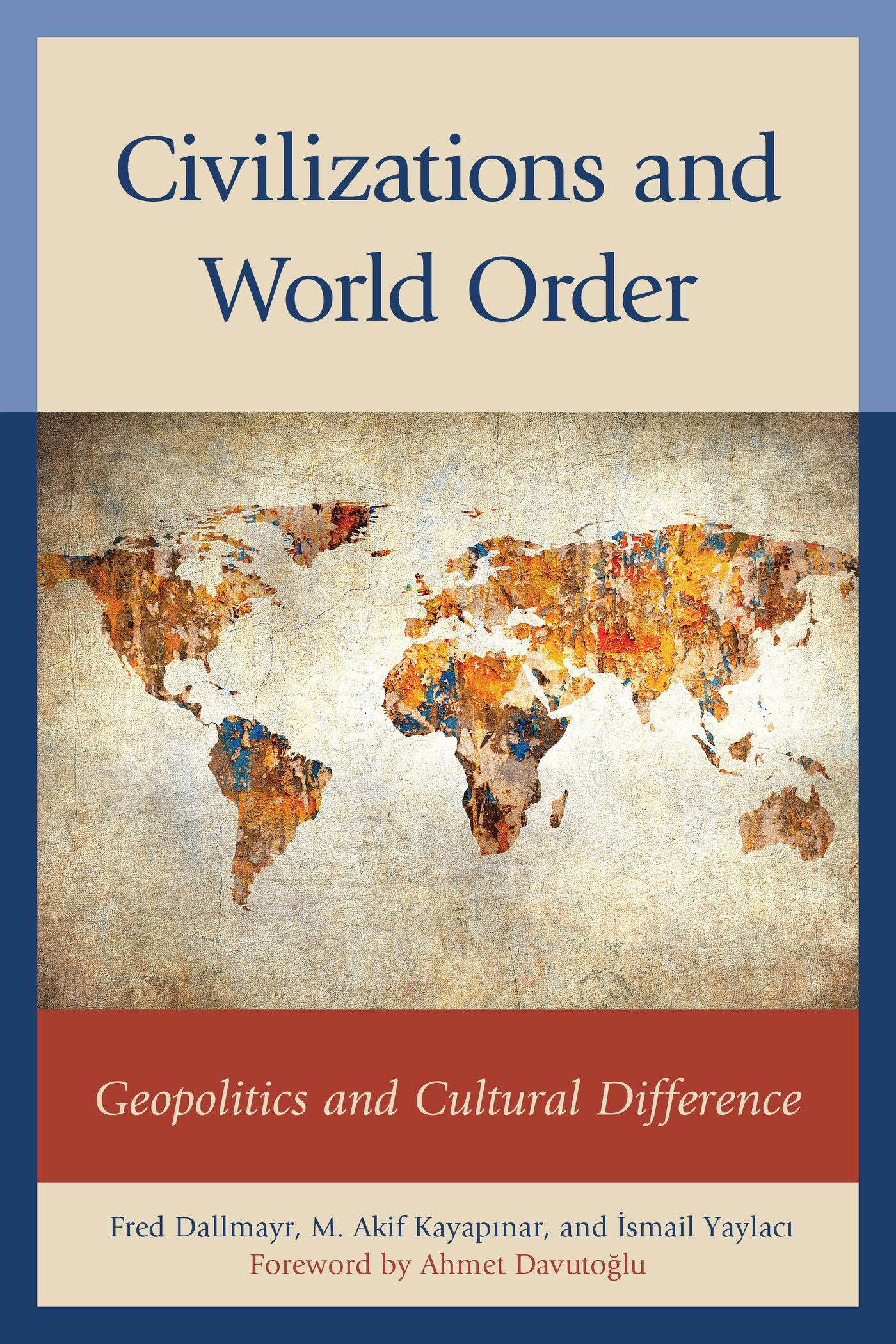Civilizations and World Order
Global Encounters: Studies in Comparative Political Theory
Series Editor: Fred Dallmayr, University of Notre Dame
This series seeks to inaugurate a new field of inquiry and intellectual concern: that of comparative political theory as an inquiry proceeding not from the citadel of a global hegemony but through cross-cultural dialogue and critical interaction. By opening the discourse of political theorytoday largely dominated by American and European intellectualsto voices from across the global spectrum, we hope to contribute to a richer, multifaceted mode of theorizing as well as to a deeper, cross-cultural awareness of the requirements of global justice.
INTERNATIONAL ADVISORY BOARD
Shlomo Avineri, Hebrew University (Israel)
J. A. Camirelli, La Trobe University (Australia)
D. P. Chattopadhyaya, Centre for Studies in Civilisations, Delhi (India)
Ahmet Davutolu, Marmara University (Turkey)
Eliot Deutsch, University of Hawaii (United States)
Chaibong Hahm, Yonsei University, Seoul (Korea)
Paulin J. Hountondji, University of Bnin (Bnin)
Hwa Yol Jung, Moravian College (United States)
Chandra Muzaffer, Just World Trust, Kuala Lumpur (Malaysia)
Ashis Nandy, Centre for the Study of Developing Societies, Delhi (India)
Thomas Pantham, M.S. University of Baroda (India)
Bhikhu Parekh, University of Hull (United Kingdom)
Abdulkarim Soroush, Academy of Philosophy, Tehran (Iran)
Charles Taylor, McGill University (Canada)
Tu Weiming, Harvard University (United States)
RECENT AND FORTHCOMING TITLES
Iran: Between Tradition and Modernity, edited by Ramin Jahanbegloo
Democratization and Identity: Regimes and Ethnicity in East and Southeast Asia, edited by Susan J. Henders
The Politics of Affective Relations: East Asia and Beyond, edited by Daniel Bell and Hahm Chaihark
From the Margins of Globalization: Critical Perspectives on Human Rights, edited by Neve Gordon
Imagining Brazil, edited by Jess Souza and Valter Sinder
Islamic Democratic Discourse: Theory, Debates, and Philosophical Perspectives, edited by M. A. Muqtedar Khan
Postcolonialism and Political Theory, edited by Nalini Persram
Remaking Turkey: Globalization, Alternative Modernist, and Democracy, edited by
E. Fuat Keyman
Civilizational Dialogue and Political Thought: Tehran Papers, edited by Fred Dallmayr and Abbas Manoochehri
The State of Nature in Comparative Political Thought: Western and Non-Western Perspectives, edited by Jon D. Carlson and Russell Arben Fox
Civilizations and World Order: Geopolitics and Cultural Difference, edited by
Fred Dallmayr, M. Akif Kayapnar, and smail Yaylac
Civilizations and World Order
Geopolitics and Cultural Difference
Edited by Fred Dallmayr,
M. Akif Kayapnar, and smail Yaylac
Foreword by Ahmet Davutolu
LEXINGTON BOOKS
Lanham Boulder New York Toronto Plymouth, UK
Published by Lexington Books
An imprint of Rowman & Littlefield
4501 Forbes Boulevard, Suite 200, Lanham, Maryland 20706
www.rowman.com
10 Thornbury Road, Plymouth PL6 7PP, United Kingdom
Copyright 2014 by Lexington Books
All rights reserved. No part of this book may be reproduced in any form or by any electronic or mechanical means, including information storage and retrieval systems, without written permission from the publisher, except by a reviewer who may quote passages in a review.
British Library Cataloguing in Publication Information Available
Library of Congress Cataloging-in-Publication Data
Civilizations and world order : geopolitics and cultural difference / edited by Fred Dallmayr, M. Akif Kayapnar, and smail Yaylac.
pages cm. -- (Global encounters : studies in comparative political theory)
Includes bibliographical references and index.
ISBN 978-0-7391-8606-0 (cloth) -- ISBN 978-0-7391-8607-7 (electronic)
1. International order--Philosophy. 2. International relations and culture--Philosophy. 3. Civilization, Modern--Philosophy. 4. Geopolitics. I. Dallmayr, Fred R. (Fred Reinhard), 1928- editor of compilation. II. Kayapnar, M. Akif, 1975- editor of compilation. III. Yaylac, smail, 1982- editor of compilation.
JZ1308.C559 2014
327.101--dc23
2014022607
 TM The paper used in this publication meets the minimum requirements of American National Standard for Information Sciences Permanence of Paper for Printed Library Materials, ANSI/NISO Z39.48-1992.
TM The paper used in this publication meets the minimum requirements of American National Standard for Information Sciences Permanence of Paper for Printed Library Materials, ANSI/NISO Z39.48-1992.
Printed in the United States of America
Foreword
Ahmet Davutolu
Civilizational Revival in the Global Age
Using the terms civilization and globalization in singular or in plural reveals not only a linguistic preference but also a position in understanding orderboth conceptually and historically. When the plural form of the concept of civilization is reserved for historical reference while its singular version is employed in reference to present and future, this preference rests on certain basic presuppositions: (i) throughout history different civilizations emerged and survived with their own geographical and historical differences; (ii) the radical changes of the modern era accelerated by scientific and technological instruments created a new historical flow directed towards the formation of a monolithic global culture; (iii) this historical flow will is led by an active/subject/dominating civilization that is able to control and re-create these instruments; (iv) the passive/object/dominated civilizations are disappearihng in the course of this process; (v) and there will effectively be only one civilization in future which will mark the end of history.
On the other hand, using the concept of civilization in the plural (civilizations) to refer not only to historical phenomena but also to present and future existence also relies on a set of certain assumptions: (i) the historical existence of different civilizations is not only a result of external factors but also a reflection of human nature and will; (ii) therefore the existence of different civilizations has been and will continue to be a richness of human culture; (iii) the relationship among civilizations has been characterized by interaction rather than absolute hierarchy and annihilation; (iv) human nature cannot be limited, monopolized, dominated, or controlled by a monolithic structure regardless of its instrumental supremacy; (v) the categories of active/subject civilization and passive/object civilizations reflect a presentism of conjectural phenomena rather than a substantive and pervasive historical process; (vi) and there might be fluctuations and transformations in inter-civilizational relations, but there are and will always be different civilizations.
These differing perspectives can be noticed both in the writings of classical historians of civilizations and in the recently developing literature on civilizations as new actors of international relations. Arnold Toynbees analysis of civilizations, for instance, provides us with differentsometimes even conflictingexamples of these two alternative approaches. The most striking example for the first approach regarding the existence of a singular civilization in the future is Toynbees prediction back in the 1930s that out of twenty six civilizations no less than sixteen are by now dead and buried

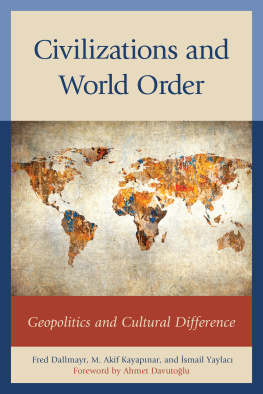
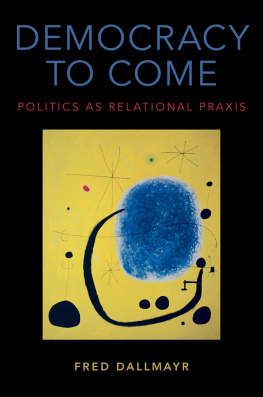
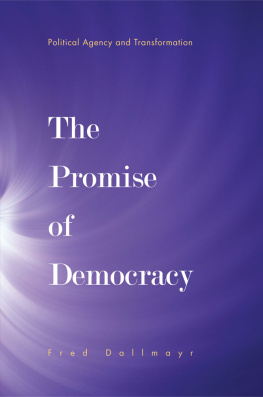

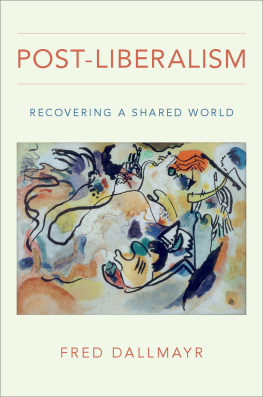
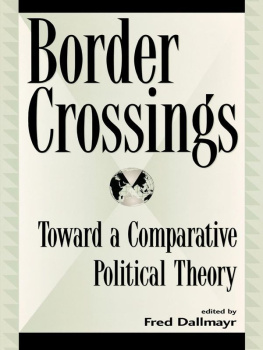

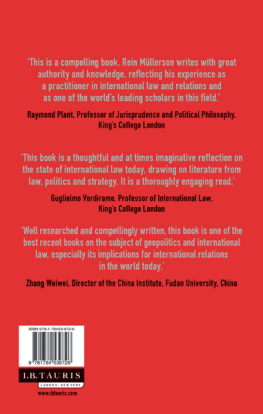
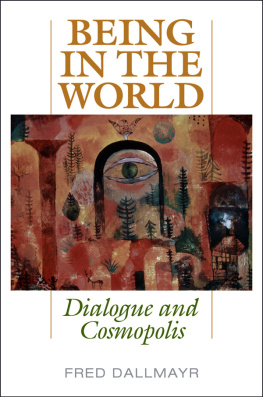

 TM The paper used in this publication meets the minimum requirements of American National Standard for Information Sciences Permanence of Paper for Printed Library Materials, ANSI/NISO Z39.48-1992.
TM The paper used in this publication meets the minimum requirements of American National Standard for Information Sciences Permanence of Paper for Printed Library Materials, ANSI/NISO Z39.48-1992.